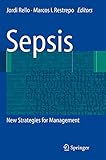Sepsis : New Strategies for Management / edited by Jordi Rello, Marcos I. Restrepo.
Tipo de material: TextoEditor: Berlin, Heidelberg : Springer Berlin Heidelberg, 2008Descripción: recurso en líneaTipo de contenido:
TextoEditor: Berlin, Heidelberg : Springer Berlin Heidelberg, 2008Descripción: recurso en líneaTipo de contenido: - texto
- computadora
- recurso en línea
- 9783540790013
- RC86-88.9
Springer eBooks
Macrolides in Severe Community-Acquired Pneumonia and Sepsis -- The Potential Role of Statins in Severe Sepsis -- The Genetics of Sepsis: The Promise, the Progress and the Pitfalls -- Corticoids in Severe Pneumonia -- Aging, Inflammation, and Pneumococcal Disease -- Nonspecific Removal of Sepsis Mediators -- Optimal Antibiotic Use in Severe Community-Acquired Pneumonia -- Dose Adjustment and Pharmacodynamic Considerations for Antibiotics in Severe Sepsis and Septic Shock.
Sepsis is an important public health problem around the world. Severe sepsis carries significant morbidity, mortality and high costs. The incidence of sepsis is increasing because of the aging population, the growing number of immunocompromised hosts, the increasing use of invasive procedures, and, to a lesser extent, antibiotic resistance among pathogens. Despite recent advances in the pathogenesis, diagnosis, and therapeutic approaches the mortality rate associated with this condition remains high. Therefore, the goal of Sepsis: New Strategies is to review novel targets to be considered in patients with severe sepsis and to assess new developments for patients with sepsis originating in the respiratory tract.
Para consulta fuera de la UANL se requiere clave de acceso remoto.


